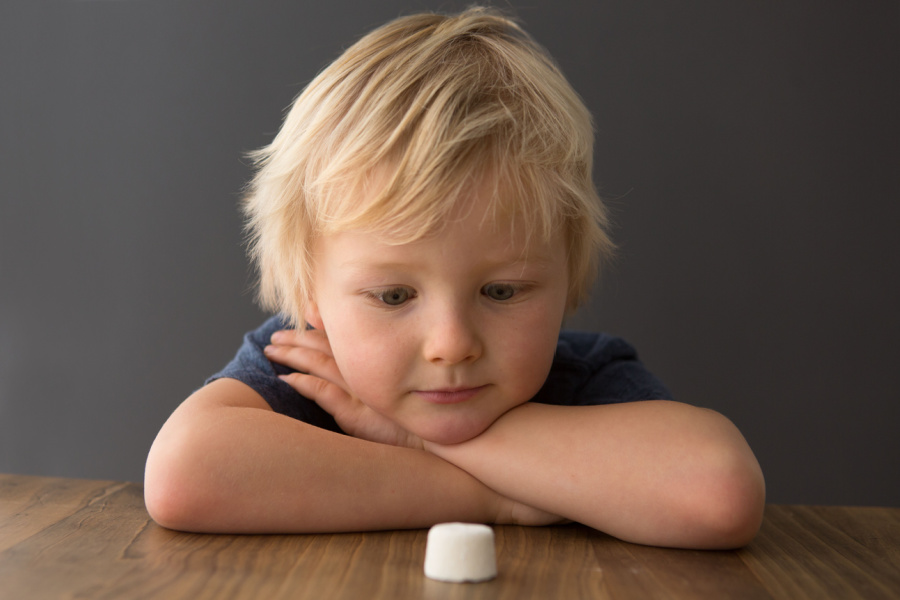Can you stop yourself eating marshmallows?
Over the summer we saw a trend on social media of parents (and some dog parents) placing marshmallows (or dog treats) on a plate in front of their children and leaving the room to see what their child did. The internet was consumed with joy as they watched these videos of small ones looking round to see when they could eat the sweets…. and laughed as so many could not restrain themselves and quickly ate them. But, what does this actually tell us?
Marshmallow Test
The Marshmallow test is a psychology based assessment developed by Walter Mischel (1972) who was a professor at Stanford University. Mischel’s “marshmallow test” became a well known source of identifying how an individuals’ ability to delay gratification in childhood is related to their later success in life. He found that the children who could resist the immediate temptation of eating a marshmallow, knowing that they would be rewarded with two marshmallows afterwards exhibited that they had higher levels of self-control. He referred to these as ‘cool’ behaviours, which could be mapped to more positive life outcomes.In comparison, children who immediate felt the urge to eat the marshmallows exhibited less impulse control or ‘hot’ behaviours.
He later followed up the study in 1988, and found that where pre-school children were able to delay gratification that ten years later they were described by parents as being more competent, it was later associated with higher SAT scores. However, perhaps most interestingly, those who were able to delay gratification had key differences in their prefrontal cortex related to impulse control and logic.

Cool or Hot
Mischel’s theory of personality and behaviour aims to distinguish between “cool” behaviours and “hot” behaviours. Cool and hot behaviours were found to be correlated to different components of self-control and cognitive processing. This became central to his Cognitive-Affective Personality System theory. His theory recognised that we all have the capacity for both cool and hot behaviours. However, it is the interplay between these two behaviours that can affect our responses in life to a range of situations. He also acknowledged that we all have the ability to develop strategies to improve and enhance our self-control and decision-making abilities, which are especially helpful in situations where we may be inclined towards hot behaviours.
Cool Behaviours include:
- Being cognitive and rational – being rational, logical and deliberate
- Being able to delay gratification – are able to put off immediate gratification in favour of long term goals or better outcomes/rewards.
- Abstract thinking – being able to think outside of the box, hypothetically and pros and cons
- Emotionally neutral – not being influenced by strong emotional impulses
- Examples – Planning for the future, studying for exams, setting long term goals and working towards them, saving for the future, making calculated decisions, stepping back to decide how to respond in conflict
Hot behaviours include:
- Emotionally driven – driven by emotional impulse and immediate desire
- Lack of delayed gratification – Prioritising immediate rewards
- Impulsive – being inclined to act on emotional impulse and not think through consequences
- Present focussed – needing immediate pleasure or distraction or relief from feelings
- Examples – Hot behaviours can be linked to stress eating, impulse shopping, risky behaviours for the thrill, angry reactions to situations which are provoking
Developing cool skills
So, how do we support children to enhance their ‘cool’ system? If we want to support children to develop their cool system skills, we need to consider:
- Emotional literacy skills
- Emotional regulation
- Practicing self-control and delayed gratification (start small and work up)
- Develop goal setting behaviours and actions
- Support problem solving skills
- Practicing gratitude
- Creating supportive and nurturing environments
- Ensuring support and accountability
- Role modelling
(Which made me smile, as this is what we teach our Dandelion child coaches…. )
It should be noted, that the marshmallow test has been shown to only be effective when adults follow through with their promises and the reward was delivered. Where a child does not believe that the promise will be kept, there is no benefit for them engaging their minds with delayed gratification. Perhaps something for us all to think about when we make promises in trade for behaviours with children…..
Want to learn more?
If you want to learn more about mental health, you can join our Level 4 training (here) or keep an eye out for our new courses coming soon (here).
© Dandelion Training and Development – All Rights Reserved
Further help
For more articles about mental health visit – ARTICLES
To learn more about child and adolescent mental health visit – COURSES
For resources to support child and adolescent mental health visit –RESOURCES

